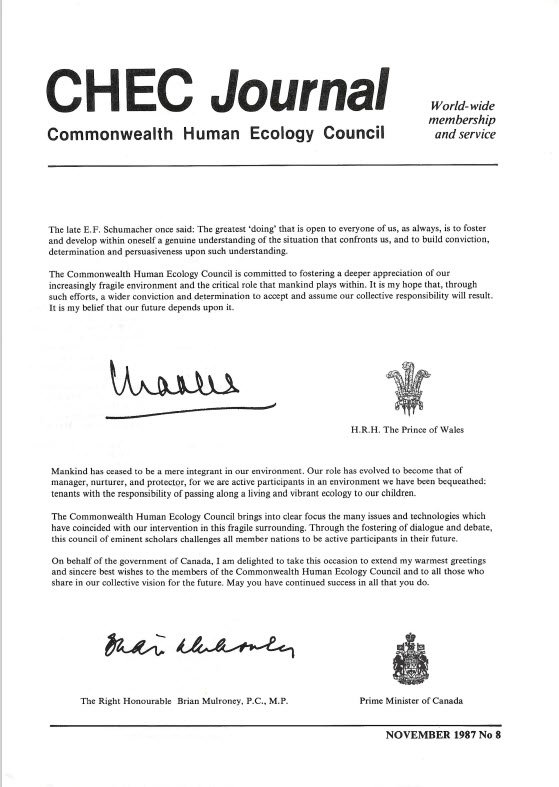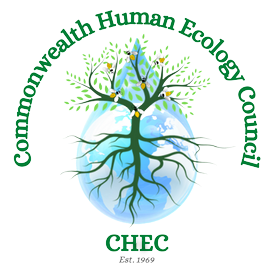
CHEC Journals
CHEC’s Journals each focus on a specific theme for the issue. All current and new journals, as well as issues numbering 23 - 34, are published digitally. Previous hardcopy issues of Human Ecology (numbers 1 - 22) have all now been digitalised and can be found on this page.
Read the full Journal here!
Human Ecology 34: Surviving a World on Fire: The need for Action
In the latest edition of Human Ecology the journal of the Commonwealth Human Ecology Council, we confront the pressing need for decisive action in response to the climate crisis. This issue brings together a range of expert perspectives, highlighting the significant challenges posed by climate change and the urgent call for collaborative solutions. Scholars and practitioners examine the socio-economic impacts, the inequities faced by vulnerable populations, and the vital role of policy reform in fostering resilience. Journal 34 aims to inspire informed dialogue and mobilise a collective response to build a sustainable future, emphasising that immediate, coordinated action is essential to mitigate the escalating threats of climate change.
Read the full Journal here!
The Commonwealth Human Ecology Council (CHEC) is excited to announce the publication of Human Ecology 33: “What a Waste!”. This edition focuses on the challenges posed by solid waste management and the innovations which are tackling solid waste across the Commonwealth.
Through a multidisciplinary lens, Journal 33 covers a wide range of topics including Municipal Waste Recycling, Fly-tipping, Oyster Reef Regeneration, Household Waste and Reusing Empty Bottles for Construction, and includes articles on Nigeria, Australia, and the UK as well as a few with a more international flavour. Edited by CHEC’s Michael Mutter, Kate Martin, and Emily Robinson Human Ecology 33: “What a Waste!” features a wide range of articles and authors from around the Commonwealth and world.
Human Ecology 33: “What a Waste!”
Read the full Journal here!
Human Ecology 32: Forests
The Commonwealth Human Ecology Council (CHEC) is delighted to announce the launch of Human Ecology 32: Forests. The publication is the latest edition of the CHEC Human Ecology journal. This edition focusses on the importance of forests and looks to celebrate H.M. The Queen’s Platinum Jubilee, The Queen’s Commonwealth Canopy, The Queen’s Green Canopy, World Environment Day and the Commonwealth Heads of Government Meeting in Rwanda.
The journal covers a wide range of topics including conservation, biodiversity, mangroves, forest management and wetlands and features articles on India, the West Indies, Australia, Aotearoa and the UK. Edited by CHEC’s Ian Douglas, Human Ecology 32: Forests features a wide range of articles and authors from around the Commonwealth and world.
Read the full Journal here!
Human Ecology 31: Pollution
Human Ecology 31: Pollution was published in April of 2021. The journal tackles the global problems associated with pollution across all the different forms it takes. Our awareness of pollution as a problem has increased in recent years, and this was a reminder that things could change.
This issue of the Journal will highlight many of the pollution problems around the Commonwealth and beyond, and also effective solutions to make the Earth healthier. Pollutants damage the quality of air, water and land. All living things creatures, from one-celled microbes to blue whales and human beings, depend on the Earth’s supply of air and water. When these resources are polluted, all forms of life are threatened.
Articles cover topics such as light, noise and air pollution across a number of locations including Sri Lanka, Bangladesh, West Africa and England. The journal features writing and contributions from all over the world.
Read the full Journal here!
Human Ecology 30: Mangroves
Human Ecology 30: Mangroves was published in June of 2020. Much of the work on the journal was conducted while the world was under lockdown due to the global COVID-19 pandemic. The Commonwealth Blue Charter (CBC) includes specific mention of the importance of mangroves for both marine and terrestrial ecosystems and biodiversity, and thus for human well-being and positive action in response to climate change. This importance embraces nature conservation, traditional human uses, such as fishing and woodcutting, and environmental roles of mangroves in protecting coastlines and mitigating climate change, particularly in uptake of carbon.
This edition of the journal specifically looks at mangroves and their importance to the world especially in relation to climate change and beings with a emotive poem and features writings from authors from across the Commonwealth.
Read the full Journal here!
Human Ecology 29: Rediscovering Nature - Education for Social Understanding of Sustainability
Human Ecology 29: Rediscovering Nature - Education for Social Understainding of Sustainability was published between Spring and Summer of 2019. It looks at how we can rediscover nature through an education for social understanding of sustainability. It builds on the recent school climate strikes and looks how we can support them go further? How can we help everyone to understand the consequences their own behaviour has on the climate?
Do people understand the links between what they eat and how they travel and the effects on climate? How about the grownups? Or companies? And how much does a politician understand? There are huge amount of information out there from scientists and researchers and NGOs but it can sometimes be hard to take in.
Read the full Journal here!
Human Ecology 28: People
Human Ecology 28: People was published in the Spring of 2018 in time for the Commonwealth Heads of Government Meeting. It highlights several threats to the environment which can cause serious problems for mankind. But it also tries to show what can – or should – be done to improve the life of humans all over the world.
To solve a problem one has to be aware that there is a problem! Many people live far from the natural environment and their knowledge and understanding is weak. Where is the food coming from? Why is the water drying up?
What can I do as an individual when I don’t know the consequences of my action? Resilience in people must be to be able to cope with a future world where climate change and pollution soon can’t be reversed.
Read the full Journal here!
Human Ecology 27: Waste
Human Ecology 27: Waste was published in the summer of 2016. Waste – something that could be discarded, of no use, and mostly quickly forgotten. Out of sight, out of mind! But our waste has become so enormous and so complex it can no longer be ignored.
If you throw a half-eaten apple into the woods it usually does no harm to the woodland ecosystem because decomposers will break it down and recycle it into new plants. But if you throw your plastic water bottle away in the woods, it becomes a problem. Artificial materials made by humans do not easily become part of ecological nutrient cycles. They have to be disposed of more carefully.
The issue is themed around the concept of Waste, with contributions from volunteers, artists and academics working towards mitigating the harmful impact of man-made materials on ecosystems. Divided into two parts, the journal highlights the range of problems we face, as well as the potential solutions.
Previous Digital Issues of the CHEC Human Ecology Journals
-

Human Ecology 23: Urbanisation
-

Human Ecology 24: Education
-

Human Ecology 25: Food Security
-

Human Ecology 26: Water
Previous Issues of the CHEC Human Ecology Journals
Digitised Hardcopies
-

Human Ecology 1
Originally Published in January 1974
-

Human Ecology 2
Originally Published in January 1975
-

Human Ecology 3
Originally Published in May 1976
-

Human Ecology 4
Originally Published in January 1978
-

Human Ecology 5
Originally Published in June 1980
-

Human Ecology 6
Originally Published in February 1983
-

Human Ecology 7
Originally Published in September 1985
-

Human Ecology 8
Originally Published in November 1987
-

Human Ecology 9
Originally Published in July 1989
-

Human Ecology 10
Originally Published in October 1991
-

Human Ecology 11
Originally Published in September 1993
-

Human Ecology 12
Originally Published in November 1995
-

Human Ecology 13
Originally Published in December 1996
-

Human Ecology 14
Originally Published in
October 1997 -

Human Ecology 15
Originally Published in July 1998
-

Human Ecology 16 & 17
Originally Published in November 1999
-

Human Ecology 18 & 19
Originally Published in
October 2001 -

Human Ecology 20
Originally Published in
May 2003 -

Human Ecology 21 & 22
Originally Published in September 2009








